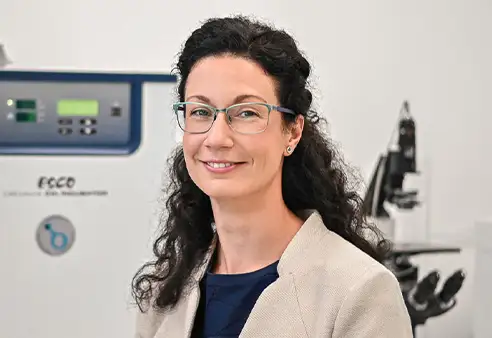MUDr. Allan Böhm, PhD., MBA, FESC, FJCS, runs the Premedix Clinic and Academy of Precision Medicine, works as a cardiologist at the National Institute for Cardiovascular Diseases, teaches at the Comenius University Faculty of Medicine, and studies remotely at the University of Oxford. His research on heart diseases combines molecular biology methods, digital technologies, and artificial intelligence.
Allan Böhm's research focuses on several areas of cardiovascular disease. Firstly, he investigates the relationship of circulating substances in the blood to atrial fibrillation. This is the most common arrhythmia, detected mainly by ECG monitoring, which has many pitfalls. That's why Allan Böhm and his team are trying to develop a diagnostic method to capture this arrhythmia through circulating biomarkers in the blood.
The second area that Allan Böhm deals with is research in thromboses, i.e. blood clots. These are responsible, for example, for heart attacks, strokes and pulmonary embolism. When working in the acute cardiology department, he noticed that the incidence of heart attacks is much higher during the day than at night. By examining this question in more detail, he found that melatonin, released at night, reduces the clotting of platelets. In further experiments, he proved that the platelets of diabetic patients do not respond to melatonin, explaining why diabetic patients experience the same incidence of heart attacks day or night, unlike non-diabetic patients.
The third area is data analysis and artificial intelligence aimed at personalised and predictive health care – precision medicine. He and his team at Premedix have developed machine learning (artificial intelligence) algorithms that can predict what will happen to a particular patient. "Based on many patient parameters and characteristics, we have created a scoring system to determine the risk of developing a complication or death in a particular patient. We can then personalize health care, i.e. tailor it to each person," explains the scientist. "For example, we can now predict which heart attack patient will develop cardiogenic shock – the most feared complication, usually resulting in death. If we can anticipate this problem, we can prevent it."
In digital medicine, he is also devoted to analysing the photoplethysmographic curve using artificial intelligence. A photoplethysmographic curve reflects blood flow in small arteries – it can be mapped, for example, by a smartwatch that monitors the heart rate based on the expansion of the capillaries in the skin. Allan Böhm and his team explore the possibilities of using the curve analysis to diagnose and monitor various diseases such as coronary heart disease or heart failure. He claims that precision medicine currently forms the core of his work and believes that in the future medicine will be directed towards personalized and predictive diagnosis and treatment.
Allan Böhm studied cardiology at Charles University in Prague. During his studies, he founded a non-profit organization called Academy, which later became a recognized clinic and research organization of precision medicine – Premedix leads several international research projects and regularly publishes in international academic journals. Currently, Böhm combines the work of a doctor, scientist, teacher, and manager at the Premedix Clinic & Academy, the National Institute of Cardiovascular Diseases, and the Faculty of Medicine of Comenius University. At the same time, he is constantly studying. Presently, he is remotely conducting clinical research at Oxford University. In his free time, he helps with student development at the Dowina university centre and relaxes while hunting in nature.



